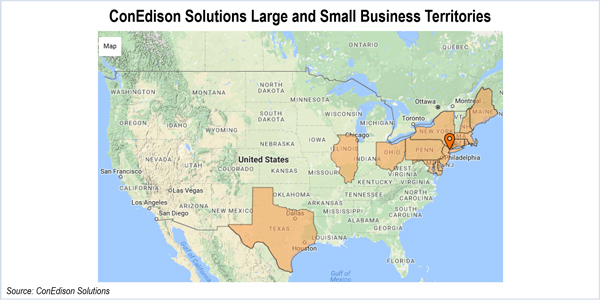By Ted Caddell and Rich Heidorn Jr.
NASHVILLE, Tenn. — Exelon’s Constellation Energy Resources unit is buying Consolidated Edison’s retail energy business as it continues its efforts to hedge against falling wholesale power prices.
Constellation’s purchase of the retail division of ConEdison Solutions will give it another 560,000 residential, commercial and business electricity and natural gas customers in Texas, D.C. and 12 states in the Northeast, Mid-Atlantic and Midwest. If completed, it will make Constellation the largest competitive energy supplier in the U.S., with 2.5 million customers. Terms of the deal were not disclosed.
“This agreement provides an opportunity to grow our retail electricity and natural gas business in strategically attractive markets where we’re best suited to match load served with Exelon generation assets,” Constellation CEO Joseph Nigro said. “ConEdison Solutions has a reputation for delivering value to customers, and our combined companies will continue that tradition with a broad array of energy products and services at competitive prices.”
“With their industry-leading position, we are confident that the retail electricity and natural gas business will continue to thrive as part of Constellation,” ConEdison Solutions CEO Mark Noyes said. “This move will enable our company to focus our attention and our resources on making energy services and renewable energy offerings even more competitive and well-positioned for rapid growth.”
Having guaranteed customers for its wholesale generation fleet protects the company from volatility in wholesale prices.
It was the company’s efforts to minimize price risk that also led Exelon to its $6.8 billion purchase of Pepco Holdings Inc. this spring. The addition of PEPCO, Delmarva Power and Atlantic City Electric brought Exelon’s customer base to 10 million.
No More Debt
Exelon CEO Chris Crane gave no hint of the Con Ed deal in an appearance Monday at the National Association of Regulatory Utility Commissioners’ summer meeting.
In an interview with NARUC President Travis Kavulla, Crane said the company would not seek debt-financed acquisitions despite the current low interest rates.
Independent power producers who seek greater leverage when interest rates are low can find themselves squeezed when rates rise, he said.
“We operate in probably a little bit more conservative way,” he said. “Our focus is actually reducing debt and maintaining a strong capital structure and understanding we’re at a low point in the [interest rate] cycle. It would not be prudent to think that this is a sustainable environment going forward.”
Meanwhile, Exelon is seeking help from state officials to eliminate the losses at its nuclear plants in Illinois and New York.
The company said in June it will close its Clinton and Quad Cities nuclear plants after the Illinois General Assembly adjourned without acting on a bill that would have subsidized the money-losing stations. (See Exelon to Close Quad Cities, Clinton Nuclear Plants.)
Crane said the company wants to preserve the plants’ 4,200 jobs — “The tax base for DeWitt County dries up and goes away if the Clinton plant shuts down,” he said — but can’t continue to absorb the losses.
In New York, where the company has three nuclear plants, it has offered to buy Entergy’s struggling FitzPatrick plant if state regulators complete a plan to subsidize them.
Crane said the company has had a “very productive dialog” in New York, adding that the state’s proposed zero emission credits would create a “level playing field for carbon-free generation.”
“If other states that our … nuclear assets [operate in] want to approach the market like that we would like to do that,” he said. (See Commenters Laud, Blast New York’s Nuclear Subsidy Plan.)





